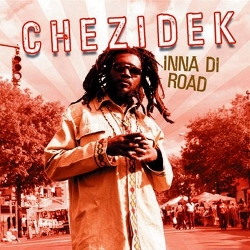Articles about reggae music, reviews, interviews, reports and more...
Inna Di Road by Chezidek

Inna Di Road by Chezidek
The tradition of the peaceful meditative rastaman lives on.
The 1970s produced a number of soft spoken, deeply spiritual reggae singers whose voices were more suited to religious and cultural themes than temporal concerns. Today, Desbert Johnson, better known as Chezidek, is one of the few who treads this introspective path.
 Hailing from St Ann's Bay (birthplace of the legendary Burning Spear), Chezidek has a limited but interesting voice that veers from a cracked mid range to a warbling falsetto and is most at home contrasting with bottom-heavy, old school sufferation rather than smooth, sweet love songs or hard-nosed dancehall. On fourth album 'Inna Di Road', he sticks exclusively to this territory, and the results are sure to impress.
Hailing from St Ann's Bay (birthplace of the legendary Burning Spear), Chezidek has a limited but interesting voice that veers from a cracked mid range to a warbling falsetto and is most at home contrasting with bottom-heavy, old school sufferation rather than smooth, sweet love songs or hard-nosed dancehall. On fourth album 'Inna Di Road', he sticks exclusively to this territory, and the results are sure to impress.
His producer for the project, Bobby 'Massive B' Konders, has garnered quite a reputation as a rebuilder of old sound system favourites, and many of the rhythms present here will be familiar to fans of classic roots and dub. The title track is based on Vivian Jackson's "Warn The Nation" (and samples Robert De Niro in The Untouchables to thrilling effect), while "Far I" borrows Dennis Brown's "Easy Take It Easy". "Dem A Fight We" is a revamp of Al Campbell's Studio 1 hit, "Take A Ride", "Vampire" utilizes The Abyssinians' "Declaration Of Rights" and a complete Xerox of Ranking Joe's "Cus Cus" rhythm is used on "She Struggles", a tribute to women who must support their families alone.
But many of the strongest tracks have less familiar foundations. "Call Pon Them" is an upbeat rallying cry over some frenetic organ licks, while "I Shouldn't Do That" marries a relentlessly positive message and a memorable pop hook. Chezidek is also notable among his brethren for his vocal commitment to environmental issues, and on hit single "Leave The Trees" he exhorts us to stop 'boring a hole in the ozone layer'.
With a time-honored sound, modern punchy production, and a dignified demeanour that precludes excessive finger wagging, Chezidek has created a throwback to the first age of roots music. The tradition of the peaceful meditative rastaman lives on.
Originally published on BBC.co.uk
Read more about this topic
Comments actually desactivated due to too much spams
Browse by categories
Recommended Articles
Latest articles
Recently addedView all
© 2007-2026 United Reggae. All Rights Reserved. Reproduction in whole or in part is prohibited. Read about copyright
Terms of use | About us | Contact us | Authors | Newsletter | A-Z














